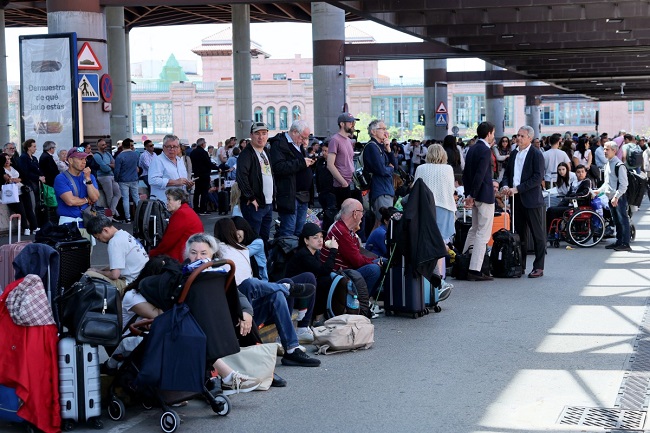A widespread power outage plunged Spain and Portugal into chaos on Monday, disrupting cellphone and internet networks, halting trains, and trapping people in elevators.
Spain’s Prime Minister Pedro Sanchez rushed to the headquarters of Red Electrica, the state electricity operator, as authorities scrambled to determine the cause of the blackout. Red Electrica warned that full restoration could take between six and ten hours and urged the public not to speculate on the origins of the outage.
Images on social media showed metro stations in darkness, trains stalled mid-journey, and commuters using phone flashlights to navigate offices and hallways. In cities like Madrid and Barcelona, AFP journalists witnessed crowds gathering in the streets, raising their phones to try to reconnect to mobile networks.
The blackout also brought road traffic to a near standstill. Spain’s national road authority, DGT, advised motorists to stop driving as traffic lights failed, leaving police officers to manually direct vehicles at intersections.
Internet monitoring group Netblocks told AFP the outage crippled much of the region’s digital infrastructure, with web activity in Spain dropping to just 17 percent of normal levels.
Portugal’s electricity operator REN confirmed the blackout affected the entire Iberian Peninsula around midday. Meanwhile, France’s electricity operator RTE reported a brief disruption in the southwest of the country, which was quickly resolved.
The European Commission said it was in contact with Spain and Portugal “to understand the underlying cause” of the outage.
Spain’s railway operator Adif said train services were halted nationwide. Airports remained operational thanks to emergency power systems, though flight delays were reported, according to operator Aena.
While Red Electrica managed to begin restoring power in some northern and southern regions, the crisis was ongoing as of late Monday.
El Pais shared images of halted metro trains, darkened newsrooms illuminated by flashlights, and police controlling chaotic traffic scenes. Hospitals, thanks to backup generators, continued to operate critical departments despite broader disruptions.
Massive blackouts have hit other parts of the world in recent years, including Argentina and Uruguay (2019), Sri Lanka (2020), and Tunisia (2023). Europe’s last major blackout was in 2006, when a grid failure in Germany left 10 million people without power across six countries.




